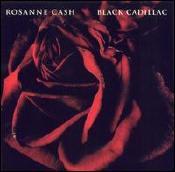 Rosanne Cash, Black Cadillac, Capitol
Rosanne Cash, Black Cadillac, Capitol
In the 1980s Rosanne Cash scored eleven number one singles on the country charts. She was a bonafide star, but her relationship with the industry was always an uneasy alliance. A natural pollination of country, pop, and folk, her music just wouldn’t fit the formula.
As the oldest daughter of Johnny Cash, she was exposed to country music throughout her formative years, but the fertile pop revolution of the sixties and seventies had a far more significant effect on her artistic development.
Black Cadillac, her eleventh album, deals head on with mortality and grief. The deaths of her mother, father, and step-mother over a two year period forced her to confront mortality on a level rarely heard in popular music.
She’s asking big questions, many that can’t be answered. There’s confusion, grief, anger, and finally, acceptance, as she attempts to come to terms all that has transpired.
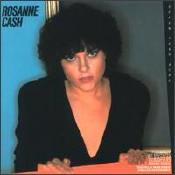 Near the end of his life C.S.Lewis – the most influential Christian writer of the twentieth century – recognized that basic theological truths offer little comfort when we’re faced with the loss of those we love. His most personal work, A Grief Observed was written in response to his wife’s death. After a lifetime defending the gospel, he wrote “Go to Him when your need is desperate, when all other help is in vain, and what do you find? A door slammed in your face and a sound of bolting and double bolting on the inside. After that, silence.” At one point he refers to God as ‘The Cosmic Sadist,’ and fears there will be no end to the anguish; "I am more afraid that we are really rats in a trap. Or, worse still, rats in a laboratory. Someone said, I believe, ‘God always geometrizes.’ Supposing the truth were ‘God always vivisects?’"
Near the end of his life C.S.Lewis – the most influential Christian writer of the twentieth century – recognized that basic theological truths offer little comfort when we’re faced with the loss of those we love. His most personal work, A Grief Observed was written in response to his wife’s death. After a lifetime defending the gospel, he wrote “Go to Him when your need is desperate, when all other help is in vain, and what do you find? A door slammed in your face and a sound of bolting and double bolting on the inside. After that, silence.” At one point he refers to God as ‘The Cosmic Sadist,’ and fears there will be no end to the anguish; "I am more afraid that we are really rats in a trap. Or, worse still, rats in a laboratory. Someone said, I believe, ‘God always geometrizes.’ Supposing the truth were ‘God always vivisects?’"
Lewis allowed doubt, fear and anger to run their course. In the end his faith was refined and eventually restored to a deeper, more profound level.
Cash made the same choice, which is testament to her strength of character. In documenting the experience, she – like Lewis – makes it universal.
The title track came shortly before stepmother June Carter Cash’s death, and was a portent of the what was to come; “One of us gets to go to Heaven/one of us has to stay here in Hell” At the time no one was aware Carter was sick. The black Cadillac is a personal metaphor – her mother would buy a new model Caddy every year, which her father would invariably wreck while high – a cycle that continued until they divorced. Traditionally, it’s also the last car you ride in, on the way to the grave. When she first wrote the song she wasn’t entirely sure what it meant, describing it as “a message from the unconscious.” The lyric upset her, even more so six weeks later when June’s unexpected death shook the entire family.
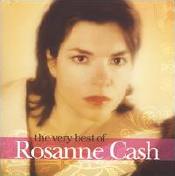 Cash claims ‘World Without Sound’ – “I wish I was a Christian, but I cannot believe/Because no one in the Bible craves my company” – will cause consternation among some fans: “I thought…that’s gonna draw a line in the sand – but I don’t care.” Like Lewis, she felt it more important to face the pain honestly, rather than try to please others. Losing those we hold dear can bring about radical changes in perspective – including ripping through rules that were never supposed to be there in the first place.
Cash claims ‘World Without Sound’ – “I wish I was a Christian, but I cannot believe/Because no one in the Bible craves my company” – will cause consternation among some fans: “I thought…that’s gonna draw a line in the sand – but I don’t care.” Like Lewis, she felt it more important to face the pain honestly, rather than try to please others. Losing those we hold dear can bring about radical changes in perspective – including ripping through rules that were never supposed to be there in the first place.
The day after her father’s funeral she visited his grave, and was inspired to write ‘God Is In The Roses,’ a calming alternative to the anger; “Every drop of rain that falls/falls for those who mourn/and God is in the Roses/and the thorns.”
She questions what happens when those so close to us die. To say ‘they’re in a better place’ sounds trite and simplistic.
Speaking with a priest at the Church of St. Luke in the Fields in New York City shortly after the funeral, she asked where her father is now. To her surprise, the priest admitted he didn’t know. His frank response was empowering, and Cash says that conversation marked the beginning of her return to faith.
A few months later, while attending a Christmas service at St. Luke, she was inspired by the choir’s rendition of ‘We Three Kings.’ Believing we’re all heading in the same direction, she used the lines “westward leading still proceeding,” for ‘The World Unseen’ a song of reflection and loss.
The disc ends with ‘The Good Intent,’ the name of the ship that brought her ancestors from Scotland to America. It tells of the vision that brought them here; “I could watch the world in smoke/there’s nothing for me here/I’ve seen behind the darkened veil… so I’ll sail off on the Good Intent/ to my true happy home…”
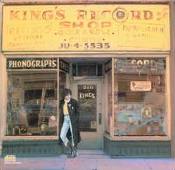 After 71 seconds of silence – the age at which both of her parents died – it’s over. In the end the wisdom she leaves us with is simply “when it all falls apart, there is love.” This is not an argument for or against any particular philosophy, it’s an honest cry from someone hurting. If it’s the responsibility of the artist to communicate, to make a connection, then she’s succeeded on every level. A fitting eulogy for those who have passed. Black Cadillac stands alongside her best work.
After 71 seconds of silence – the age at which both of her parents died – it’s over. In the end the wisdom she leaves us with is simply “when it all falls apart, there is love.” This is not an argument for or against any particular philosophy, it’s an honest cry from someone hurting. If it’s the responsibility of the artist to communicate, to make a connection, then she’s succeeded on every level. A fitting eulogy for those who have passed. Black Cadillac stands alongside her best work.
Rosanne Cash, The Very Best of Rosanne Cash, Columbia/Legacy
Rosanne Cash, Seven Year Ache, Columbia/Legacy
Rosanne Cash, Kings Record Shop, Columbia/Legacy
Rosanne Cash, Interiors, Columbia/Legacy
A number of Cash’s discs have been reissued recently, all with bonus tracks.
Seven Year Ache was her 1981 breakthrough disc. The album, including an unforgettable title track, blended seventies pop sensibility with country in a way never before attempted, and helped set the scene for changes that would redefine Nashville in the eighties.
Her biggest seller, 1988’s Kings Record Shop produced four number one singles, including a memorable take on John Stewart’s ‘Runaway Train,’ Caught her at the peak of her popularity, this was the last release that Nashville fully embraced.
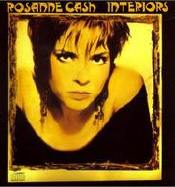 1990’s Interiors chronicled the dissolution of her marriage to Rodney Crowell. The album ranks with Fleetwood Mac’s Rumors, Richard and Linda Thompson’s Shoot Out The Lights and Marvin Gaye’s Here, My Dear as unflinching looks at the dark side of love gone wrong, and in many ways is the spiritual precursor to Black Cadillac. It lost her radio support, but took her music to a whole new level.
1990’s Interiors chronicled the dissolution of her marriage to Rodney Crowell. The album ranks with Fleetwood Mac’s Rumors, Richard and Linda Thompson’s Shoot Out The Lights and Marvin Gaye’s Here, My Dear as unflinching looks at the dark side of love gone wrong, and in many ways is the spiritual precursor to Black Cadillac. It lost her radio support, but took her music to a whole new level.
The Very Best of Rosanne Cash offers a great overview of her career, and confirms that she just gets better as the years go by. It samples from everything up to and including 2003’s Rules of Travel, her most recent release before Black Cadillac. The track included from that disc is ‘September When it Comes,’ a touching duet with her father that addressed mortality, and was recorded shortly before his passing.
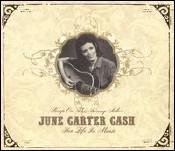 June Carter Cash, Keep On the Sunny Side: Her Life In Music, Columbia
June Carter Cash, Keep On the Sunny Side: Her Life In Music, Columbia
She’s best known today as Johnny Cash’s wife and occasional singing partner, but that limited description hardly does her justice.
June Carter was born into music royalty. Her mother Maybelle, uncle A.P. Carter and Aunt Sarah made up the Carter family, who helped birth both folk and country music in the 1920s. June and her sisters Anita and Helen would join the group a decade later.
Something of a renaissance woman, she dabbled in many areas.
As an actress she studied with director Elia Kazan, and later at the prestigious Actors Studio under Lee Strasberg, where she worked with James Dean and Marlon Brando. She never pursued the vocation, but appeared occasionally on the television series Dr. Quinn, Medicine Woman and in the Robert Duval film The Apostle.
She wrote books – including two autobiographies – and composed hit songs, including two of Johnny’s biggest hits, ‘Ring of Fire,’ and ‘Jackson.’ The latter was also a pop hit for Lee Hazelwood and Nancy Sinatra. One of her many songwriting partners was the legendary Broadway composer Frank Loesser.
She also continued the impressive family line as mother to Carlene Carter and step-mother to Rosanne Cash, both formidable talents. Her son-in-laws included Nick Lowe, Marty Stuart and Rodney Crowell. Hank Williams made her God-mother to Hank Jr., and President Jimmy Carter was a distant cousin. She first heard the music of future husband Johnny Cash when her tour mate Elvis Presley played her his records.
She only recorded three proper solo albums. After two failed marriages, she claimed her relationship with Johnny was more important than spending time in the studio.
Keep On The Sunny Side spans her entire recording career.
The compilers have pulled material from a number of sources. That’s good news, as many songs have never before been on disc. There’s guest appearances, duets and solo recordings. The set – beautiful packaged with faux binding and essays from Holly George Warren and Elvis Costello – opens with an excerpt from a Carter Family radio broadcast when she was nine years old. She was already a vet, having studied classical piano and autoharp since five. She later took up guitar, banjo and mandolin as well.
June was an excellent comedian, excelling at cornpone humor. Two tracks with Homer and Jethro bear that out, a parody of ‘Baby, It’s Cold Outside,’ and ‘Country Girl’ which includes the line “if ignorance is bliss, I’m the nation’s biggest blister.”
There’s even some proto-rockabilly with the 1949 original ‘Root, Hog or Die.’
Her first solo album – 1975’s Appalachian Melody – is included in it’s entirety. A 1999 duet with Marty Stuart – who called her “the best ex-mother-in-law I ever had” – comes from her second album, Press On, which won a Grammy for best traditional folk album.’ It’s follow-up, Wildwood Flower won the same award after her passing.
There are three different versions of the title track; the Original Carter Family on a 1939 radio broadcast, Mother Maybelle, the sisters and Johnny from 1964, and finally, June, her children and grandkids 64 years later.
Mark Zwonitzer and Charles Hirshberg, Will You Miss Me When I’m Gone? The Carter Family and Their Legacy In American Music, Simon & Schuster
Will You Miss Me When I’m Gone is the first book length exploration of the Carter Family, easily the most influential family in country – and folk – music’s history. Coming from the Virginia Mountains, the trio, made up of A.P.Carter, his wife Sara and sister-in-law Maybelle (married to A.P.’s brother ‘Eck.’) were there at the birth of modern country and folk, singing hymns, ballads, and songs of death and betrayal, all collected by A.P.
First recording in 1927, by the thirties they were the most popular act in the country. Sara and A. P. divorced due to the latter’s philandering, and she subsequently married his cousin, but the original group continued to record until 1943, when Sara moved to California. A.P. opened a general store back in Virginia. Maybelle retained the name, bringing in her daughters Helen, June, and Anita. June’s marriage to Johnny Cash is covered, including the unwavering support Cash received from in-laws Sara and her husband Eck. The Carter family story is dramatic, with a degree of sadness that equals the songs they sang.
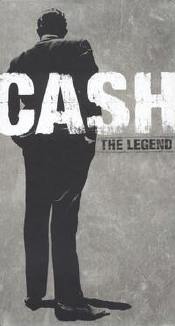 The Man Called Cash, by Steve Turner, W.PublishingThomas Nelson
The Man Called Cash, by Steve Turner, W.PublishingThomas Nelson
Johnny Cash, The Legend, Columbia/Legacy
Johnny Cash, The Legend of Johnny Cash, Island/American/Columbia/Legacy
Dave Urbandski, The Man Comes Around: The Spiritual Journey of Johnny Cash, Relevant Books
Michael Streissguth (Editor), Ring Of Fire: The Johnny Cash Reader, Da Capo Press
Various, Johnny’s Blues: A Tribute To Johnny Cash, Northern Blues
There are new Cash-related CDs and books released on a seemingly weekly basis. Here are a few of the more high-profile titles.
The Legend is a beautiful package Four discs, 104 recordings in total, including seven previously unreleased tracks, plus a sixty page booklet.
Rather than present material in chronological sequence, the compilers have opted to go with a separate theme for each disc; Win, Place and Shot – The Hits gathers the obvious chart hits, Old Favorites and New, contains more of his most popular numbers. Great American Songbook consist of songs written by Hank Williams, Leadbelly, Jimmie Rodgers, A.P. Carter and other quintessential Yank composers. Finally, Family and Friends collects duet and group recordings with everyone from Willie Nelson and Waylon Jennings to Bob Dylan and U2.
The whole thing clocks in at just over five hours, but it’s only an introduction, and whets the appetite for more.
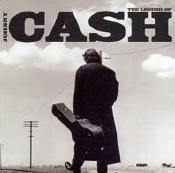 The Legend of Johnny Cash is a single disc of twenty one recordings covering most of the labels he recorded for, from Sun to American Records.
The Legend of Johnny Cash is a single disc of twenty one recordings covering most of the labels he recorded for, from Sun to American Records.
While Legend and The Legend of Johnny Cash share similar titles, none of the later Rick Rubin tracks are included in the box set – anything from the last years is from outside sessions – whereas six are included here, weighing heavily towards the latter part of his career. Add a couple of later duets and almost half of the album comes from the final decade of his life. The majority of the hits are here, but it would have been nice to shave a bit off the back end and include a few more from his prime.
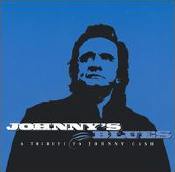 Johnny’s Blues is the third tribute disc to Cash in as many years. Unlike the first two, which featured major acts like Bruce Springsteen, Bob Dylan, and Rodney Crowell – this out of necessity offers more obscure acts. Emphasizing the bluesier elements of his music, thirteen performers, including Garland Jeffreys and Mavis Staples offer performances that, remind the listener of how wide ranging Cash’s influence was. Like most tribute discs, they can be enjoyable, but they’ll never take the place of the original.
Johnny’s Blues is the third tribute disc to Cash in as many years. Unlike the first two, which featured major acts like Bruce Springsteen, Bob Dylan, and Rodney Crowell – this out of necessity offers more obscure acts. Emphasizing the bluesier elements of his music, thirteen performers, including Garland Jeffreys and Mavis Staples offer performances that, remind the listener of how wide ranging Cash’s influence was. Like most tribute discs, they can be enjoyable, but they’ll never take the place of the original.
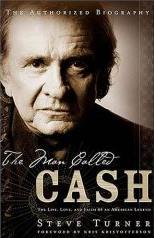 There are enough Johnny Cash biographies to fill a bookshelf. A Man Called Cash, subtitled The Life, Love, and Faith of an American Legend is one of the best. Steve Turner offers a well-balanced depiction, showing how he struggled – and failed – just like the rest of us. Today he’s an icon, but there’s no Saint Johnny propped up here. Old friend Marshall Grant claims he had two distinctive sides to his personality, especially in the old days: “John R. Cash was one of the greatest human beings who ever walked the face of this earth, but Johnny Cash was probably the greatest jerk that ever lived.”
There are enough Johnny Cash biographies to fill a bookshelf. A Man Called Cash, subtitled The Life, Love, and Faith of an American Legend is one of the best. Steve Turner offers a well-balanced depiction, showing how he struggled – and failed – just like the rest of us. Today he’s an icon, but there’s no Saint Johnny propped up here. Old friend Marshall Grant claims he had two distinctive sides to his personality, especially in the old days: “John R. Cash was one of the greatest human beings who ever walked the face of this earth, but Johnny Cash was probably the greatest jerk that ever lived.”
Thankfully, the good outlasted the bad.
He impacted believers far and wide. Bono is quoted regarding his own frustrations dealing with the Americanization of Christianity; “People were selling God like a commodity, and I couldn’t relate to them. Then I met Johnny Cash and I felt like him. You read the Scriptures and you realize that he’s actually like these guys in the Scriptures…”
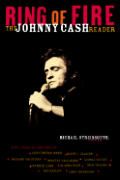
 The Man Comes Around focuses on the spiritual elements of Cash’s life. An admirable effort, the book covers major career events, but by focusing on one subject at times risks missing the bigger picture. In many ways Ring Of Fire, a collection of writings about Cash that span fifty years is far more informative, giving a more well-rounded portrait. Includes writers like Ralph J. Gleason, Nick Tosches, as well as interviews with Cash.
The Man Comes Around focuses on the spiritual elements of Cash’s life. An admirable effort, the book covers major career events, but by focusing on one subject at times risks missing the bigger picture. In many ways Ring Of Fire, a collection of writings about Cash that span fifty years is far more informative, giving a more well-rounded portrait. Includes writers like Ralph J. Gleason, Nick Tosches, as well as interviews with Cash.
Marty Stuart and his Fabulous Superlatives, Souls’ Chapel, Universal
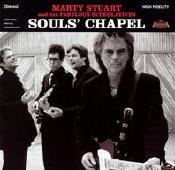 Marty Stuart’s albums have always carried country music’s history with them, including rockabilly, honky tonk, and bluegrass. He’s added some blues and R & B into the mix for Soul’s Chapel, his first ever gospel album.
Marty Stuart’s albums have always carried country music’s history with them, including rockabilly, honky tonk, and bluegrass. He’s added some blues and R & B into the mix for Soul’s Chapel, his first ever gospel album.
The Staple Singers influence is prominent throughout. The disc opens with Pop Staples’ ‘Somebody Saved Me’ on which Stuart plays Pop’s old guitar, and Mavis Staples shows up singing on her father’s ‘Move Along Train.’
Divided into originals, a few select covers and some traditional material, Stuart has managed – like the Staples – to take from a wide variety of sources and create a cohesive statement. In the liner notes he writes of his belief that God loves all kinds of music; “Under the anointing power of the Almighty presence, the gospel can be proclaimed in the bluest tones in the middle of a Mississippi cotton field as well as it can in the most gothic of Cathedrals.” For those not convinced, he includes Pops Staples’ shrewd observation; “How can God look down on the is world and not get a bad case of the blues?”
A fine effort.
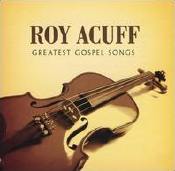 Roy Acuff, Greatest Gospel Songs, Curb
Roy Acuff, Greatest Gospel Songs, Curb
In his day Roy Acuff was a major star. Known as the King of Country music, his popularity was such that he even tried his hand at politics, running unsuccessfully for Governor of Tennessee.
He first came to fame through the Grand Ole Opry in 1938, where he sang ‘Great Speckled Bird,’ a song with curious Biblical apocalyptic imagery. Within a few months of his debut he was drawing more fan mail than any other act on the venerable show. His heartfelt delivery – frequently breaking into tears as he sang – was a favorite with the audience, and he was appointed Grand Marshall of the Opry, performing there until his death in 1992.
There are numerous quality collections of his work available. This isn’t one of them. A budget release with only a dozen tracks, generic cover and minimal information, leave this on the shelf. The vast majority of his repertoire was gospel-based, so just about any collection will have a hefty dose. If you want to stick strictly with gospel, a far better choice is Gospel Favorites (Music Mill).
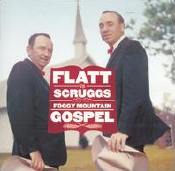 Flatt & Scruggs, Foggy Mountain Gospel, Columbia/Legacy
Flatt & Scruggs, Foggy Mountain Gospel, Columbia/Legacy
A double-disc collection of Bluegrass’s favorite duo collects all of the gospel material they recorded for the Columbia label between 1951 and 1966. Clocking in at over two hours, almost half of the 52 tracks are original compositions. This is done up right, with informative liner notes, great sound, and fantastic playing, showcasing the duo at the peak of their popularity.
 Sue Malcolm, Highrise Lonesome, Lynn Canyon Music
Sue Malcolm, Highrise Lonesome, Lynn Canyon Music
Sue Malcolm is a Vancouver treasure. Whether she’s running her Slow Pitch jams, playing bluegrass with False Creek, or entertaining children as the leader of the Buddy System, the woman gets around. A formidable presence both on and off stage, Highrise Lonesome is her first ever solo release. Great title, too.
There’s a bit of old time country, some hard driving fiddle, but mostly, it’s straight, unadulterated bluegrass. She sticks to vocals throughout, bringing in a varied cast of support players that lets her shine.
While certainly not a gospel album, Bluegrass is so tied to the form that it’s pretty hard to find a release that doesn’t include a spiritual. In this case, it’s ‘River of Jordan,’ one of the disc’s standouts. Another is a cover of the late Betty McDaniel’s (Chaba) ‘Let’s Be Sweethearts’ which has never been recorded before. McDaniels was well loved within the local Christian community, and it’s great to see her music continue to reach new fans.
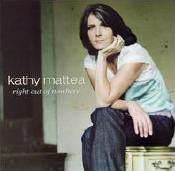 Kathy Mattea, Right Out of Nowhere, Narada/EMI
Kathy Mattea, Right Out of Nowhere, Narada/EMI
Kathy Mattea’s Right Out of Nowhere is a collection of acoustic-based songs that touch on faith. Once a major country act, that ship has passed, and she’s now free of major label constraints. Her personal life has gone through a number of major changes in the past couple of years, including the death of both of her parents, almost divorcing her husband, and getting dropped from two record labels. As devastating as all this was, she says it was also freeing. “…I learned that when you have nothing left to lose, you are able to take the biggest risk. I am learned to embrace the lovely paradoxes of this life, and I have found miracles, some tiny, some unfathomable.”
She follows her muse, self-producing a disc that’s far more satisfying than anything from her hit making years. Gospel – along with folk and bluegrass – have always been part of her sound. Since the 80s her music has gotten more roots-oriented, and Celtic elements have become more pronounced – she’s made numerous trips to Scotland over the past few years to explore the relationship between traditional country and Celtic music.
This is not the first time she’s dealt with faith. In 1993 she released Good News, a gospel-themed Christmas album, and Joy For Christmas Day came out ten years later. Right Out of Nowhere is less straightforward. These are not your Grandmother’s gospel songs. ‘Gimme Shelter’ and Creedence Clearwater’s ‘Down On the Corner’ are not likely to make it into hymnals anytime soon, but they work well here. The mood throughout is of moving on, especially the title track, and Darrell Scott’s ‘Love’s Not Through With Me Yet’ a life-affirming highlight. The disc ends with a nice reading on a tried and true gospel standard, ‘Wade In the Water.’
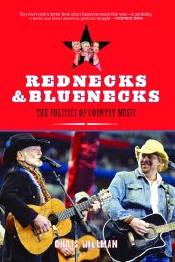 Rednecks and Bluenecks, by Chris Willman, The New Press
Rednecks and Bluenecks, by Chris Willman, The New Press
Since it’s inception, Country music has been misunderstood. Talk about your stereotypes – as the media paints Christians as judgmental hypocrites, the country fan fares about as well. Conservative, flag-waving hayseeds.
From rowdy honky tonk to hymns, the music reflected working class ethos, celebrating Saturday night and Sunday morning with equal fervor. The truth is, left, right, or center, all political persuasions are represented. Brokeback Mountain may have brought the idea of gay cowboys to the public’s attention this year, but the Journal of Country Music had already done a cover story on gays and country six years ago.
As music industry sales decline each year, country music continues to sell. Last year there were over 2,000 country radio stations broadcasting in the US. The next closest music format was oldies, with just under 800 stations. Rock, Top 40 and Urban trail far behind.
Sales might be healthy but that hardly means the form is in great shape.
Willman begins by recounting the Dixie Chicks debacle of 2003. During a concert in London – as the U.S. was about to invade Iraq – Natalie Maines commented to the audience “Just so you know, we’re ashamed the president of the United States is from Texas.” For the most part the remark was ignored by the British press. Only one reviewer even bothered to mention it. But once the American media got involved the backlash began.
At the time the group had the top selling album in the nation. Their latest single was number one, and their upcoming American tour had broken the all-time record for one day concert sales in less than 24 hours, bringing in $49 million dollars. They were – and remain – the biggest-selling female band in history.
Country radio was the first to distance themselves, with many stations vowing to never again play the group’s material. It turned out the push was coming from talk radio – the second largest radio format. Outrage generates listeners, and this was great for ratings.
The backlash extended to their families. Maine’s father – a respected producer – had all of the records he had produced banned by a radio conglomerate. An aunt who worked as an anchor woman in Lubbock was taken off the air. There were mass Cd burning parties – the first since John Lennon had said the Beatles were more popular than Jesus almost forty years before – even death threats.
Other performers outside of Country were far harsher towards the President with no discernable effect on airplay or sales. Pearl Jam’s Eddie Vedder physically impaled a Bush mask every night of the band’s tour. Celebrities in Hollywood were just as vicious, but nobody boycotted their films.
The group’s first studio album since the debacle comes out next month. The disc’s first single, ‘Not Willing To Make Nice’ – addresses the issue head on, making it crystal clear that they’re not backing down anytime soon.
Democrats pretty much dominated the South for over a hundred years, but by the 1960s the party’s socially-progressive policies were beginning to alienate voters in the region. When President Lyndon Johnson signed the civil rights amendment in 1964 Democrats held twenty-two of the twenty-four available Senate seats for the region. The numbers were exactly reversed in the Republican’s favor following the 2004 election.
Both sides obviously feel strongly that things have gone wrong.
Nashville’s Music Row Democrats commissioned a theme song entitled ‘Takin’ My Country Back.’ Performed by a group calling itself Honky Tonkers for Truth after too many high profile members of the party refused to have their names associated with the song, at the same time, Meanwhile, The Right Brothers – who unashamedly court the rightwing conservative audience – sing ‘I Want My Country Back.’
Many identify themselves as Christians.
Ronnie Dunn of Brooks & Dunn studied to become a Baptist minister before his career took off, and admits that today “…religion scares me to death. Historically, it’s probably the cause of more deaths than any other force on the planet.” He has little time for TV preachers; “Here you turn on the TV and see these TV evangelists going at it, and you want to say, ‘Give me some air. Back away from the pulpit, dude!’ He wrote ‘Holy War’ which is critical of radicalism on both sides, not just the Taliban. Fearful of the message being taken the wrong way, his label refused to list the song on the duo’s Cd, burying it as a hidden track at the end of the disc.
Sara Evans tells of a letter from a young girl claiming her Mother won’t let her listen to Evan’s records “because you can’t be a Christian and famous at the same time.”
Ricky Scaggs manages to retain his conservative values in part due to his decision to play bluegrass music exclusively. The music is steeped in tradition, and consequently traditional values are a vital ingredient of the music’s lyrical content. Scaggs admits it’s easier to say he’s a born-again Christian than that he’s a conservative Republican.
Songwriter Mark Hummon’s parents – both Christians – worked for the state department, and he grew up traveling the world, learning respect for other cultures. A Nashville publisher advised him that songwriters should attend prayer meetings, and he was happy to attend, but quickly learns you don’t think outside the box in Music City.
In the course of the evening he brought up his admiration for Thomas Merton, how he’d visited a Trappist monastery, and that he was impressed with much of Buddhism. He quickly learned to keep his mouth shut.
He questions how “the Christian right can feel comfortable about a pre-emptive strike without clear evidence of eminent threat. How they think that that is a Jesus position…How they’re able to pull the militant response of the United Stages out of the gospels is an absolute riddle.”
Ironically, while he’s deemed to radical for Nashville, he finds it just as frustrating working in New York City, where he’s accused of promoting a ‘right-wing Christian agenda’ because he refers to God in his songs.
Todd Snider figures he must have a defective Bible; “Mine didn’t tell me to change anybody, or tell me to hunt and destroy all sin. Mine said forgiveness was the most important thing there was and pride was the worst. Mine said if someone takes your shirt, give them your coat…”
Songwriter Bobby Braddock, notes that in the sixties and seventies, there was nothing political attached to one’s religious beliefs. “I read the New Testament as a message for tolerance, for lifting people up and taking care of the poor and underprivileged. I cannot find the biblical justification for trickle-down economics…” He’s a Democrat, but feels strongly that the party must move towards the center, particularly in the area of abortion rights.
Steve Earle couldn’t disagree more, feeling the party has already ceded far too much to bring back the southern states, alienating the left in the process.
Then there’s Raul Malo, who was shocked to overhear two women discussing the rapture; “What day and age is this? Do you people know that the earth is round and not flat, and that we have electricity?”
Neither side comes across as any more enlightened that the other. Everyone seems to take an inordinate amount of pride in being American, but just what that means is open to interpretation. Battle lines are drawn, with both sides spouting slogans, and very little listening going on.
In the midst of all the bickering, Buddy Miller comes across like a breath of fresh air. He’s not a member – or a fan – of either party. What concerns him is the polarization, and the amount of vitriol directed towards Bush. He figures the president has done a less than stellar job of leading the country, but believes there are ‘good folks on both sides.’ Willman posits that hopefully there are more like Miller than we realize.
Representing all sides of the issue with respect – and without imposing his own viewpoint – Willman has written a fascinating, if at times depressing account of a fragmented music scene.
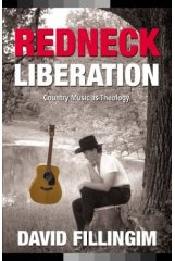 Redneck Liberation: Country Music as Theology, by David Fillingim, Mercer University Press
Redneck Liberation: Country Music as Theology, by David Fillingim, Mercer University Press
As a pastor based in rural South Carolina, David Fillingim realized that much of the denominational literature he was expected to use in his job assumed a context far different from what his working-class parishioners could relate to. He left the pastorate to pursue a Ph. D. in Christian ethics, and is now assistant professor of religion and philosophy at Shorter College.
That frustration led to Redneck Liberation, which examines theological expression within country music. There are hundreds of books exploring African-American music and religion in the south, but precious few on the southern white poor.
After examining the historical context, Fillingam looks at Hank Williams and his influence on subsequent generations of entertainers, and then moves to the 1980s and Garth Brooks, as the music went mainstream. Both Williams and Brooks recorded under the banner of country, but outside of that the two have precious little in common. Brooks has been disparagingly referred to as the ‘Anti-Hank,’ yet Fillingim makes a good argument for including both.
He calls country music “the theological self-expression of the Hillbilly or Redneck,” and claims the suffering and cheating songs are similar in function to “the Psalms of lament, providing a framework for raising or deepening misery and despair to the level of ultimate concern and then releasing them.”
An interesting read, although Fillingim comes close to over analyzing at times. Better to just put on some Hank Williams or George Jones and listen.
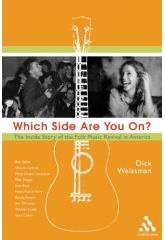 Which Side Are You On?, by Dick Weissman, Continuum
Which Side Are You On?, by Dick Weissman, Continuum
Which Side Are You On? explores the history and various subgenres of American folk music, with an emphasis on it’s social and political impact. From the folk song collectors of the 1800’s to the folk revival of the late 50s/early 60s and beyond, it’s a fascinating read.
Weissman is one of the few chroniclers of the music who was actually involved on the scene as a performer. He played banjo with the Journeymen, an early sixties folk trio that included John Phillips, who would later go on to lead the Mamas & Papas, and Scott McKenzie, who had one of the all time great flower power hits with the Phillips penned ‘If You’re Goin’ To San Francisco (Be Sure to Wear Some Flowers In Your Hair).’ After the group disbanded Weissman remained on the scene, working as a songwriter, producer, writer and session player.
He’s opinionated, which is both a strength and weakness here. We get an insider’s view, but sometimes he relies on memory when he should have checked the facts. There are quite a few mistakes – especially songs titles – that in the end render much of what he says as less than authoritative.
Bill C. Malone; Singing Cowboys and Musical Mountaineers, University of Georgia Press
Bill C. Malone: Don’t Get Above Your Raisin’ – Country Music and the Southern Working Class, University of Illinois Press
Charles K. Wolfe – Classic Country: Legends of Country Music, Routledge
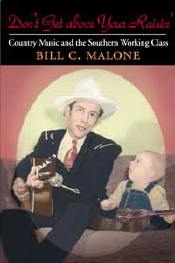 Much like Contemporary Christian Music, country has long been perceived –mistakenly – as music of the right wing, when if fact that was merely the most visible element. Easily lampooned, the public perception of a hayseed mentality went hand in hand with much of what the industry encouraged. With such a confused history, it’s no wonder that what passes for country today is so far removed as to leave the listener confused as to what actually makes something country. A hint – it’s not the hats. Like black music, it lacked respect. The difference is, by the 1960’s black blues artists were held in high regard. Country has yet to achieve any real degree of respectability.
Much like Contemporary Christian Music, country has long been perceived –mistakenly – as music of the right wing, when if fact that was merely the most visible element. Easily lampooned, the public perception of a hayseed mentality went hand in hand with much of what the industry encouraged. With such a confused history, it’s no wonder that what passes for country today is so far removed as to leave the listener confused as to what actually makes something country. A hint – it’s not the hats. Like black music, it lacked respect. The difference is, by the 1960’s black blues artists were held in high regard. Country has yet to achieve any real degree of respectability.
Legendary country acts no longer record on country labels. After being unceremoniously dropped by Columbia and later Mercury records, Johnny Cash experienced an astounding renaissance after signing with American, whose roster included Danzig, Slayer, and System of A Down. Merle Haggard signed with Epitaph, a punk label, and Waylon Jennings released his finally recordings on Ark 21, the label’s only country act. Each of these artists were producing some of the best music of their career, yet totally ignored in Nashville.
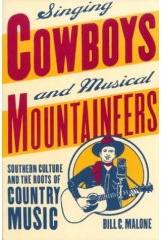 Instead, Nashville was promoting good looking, formulaic acts with no originality or sense of history. Tellingly, country radio avoided the multi-platinum soundtrack to O Brother Where Art Thou? That disc, which featured traditional bluegrass was all but ignored by the Nashville establishment, while going on to sell more than more commercial acts like Faith Hill and Creed.
Instead, Nashville was promoting good looking, formulaic acts with no originality or sense of history. Tellingly, country radio avoided the multi-platinum soundtrack to O Brother Where Art Thou? That disc, which featured traditional bluegrass was all but ignored by the Nashville establishment, while going on to sell more than more commercial acts like Faith Hill and Creed.
Hank Williams – the single most important figure in Country – called himself a ‘folksinger’ claiming he sang for just plain folks.
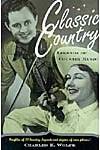 Bill C. Malone is one of the great chroniclers of country music. He wrote the Country Music USA, the definitive work on the music and it’s history. In Don’t Get Above Your Raisin’ he traces the music’s affinity with the working class. Also reissued is his Singing Cowboys and Musical Mountaineers, which explores the music’s roots and relation with the south, and it’s early rise in popularity via film. Essential to understand where things went, and why it fell apart.
Bill C. Malone is one of the great chroniclers of country music. He wrote the Country Music USA, the definitive work on the music and it’s history. In Don’t Get Above Your Raisin’ he traces the music’s affinity with the working class. Also reissued is his Singing Cowboys and Musical Mountaineers, which explores the music’s roots and relation with the south, and it’s early rise in popularity via film. Essential to understand where things went, and why it fell apart.
Another great writer, the recently deceased Charles K. Wolfe, profiled fifty influential country performers in Classic Country. From lesser known but influential acts like DeFord Bailey, the first African-American member of the Grand Ole Opry, and Albert Brumley, composer of gospel standards ‘I’ll Fly Away’ and ‘Turn Your Radio On,’ to more well known pioneers of the genre, including the Carter Family, the stories are illuminating, showing how the music came to be. All those profiled are worth checking out.
© John Cody 2006
